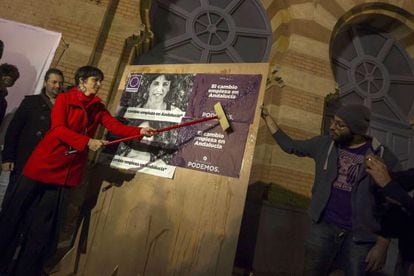Andalusia candidates represent a new generation of leaders
Though young, the main contenders in the regional race are far from political novices

Susana Díaz (Socialist), Juan Manuel Moreno (Popular Party), Antonio Maíllo (United Left), Teresa Rodríguez (Podemos) and Juan Marín (Ciudadanos) are the top candidates for the five parties most likely to win seats in the Andalusian regional elections on March 22, according to the polls.
Even though all are appearing at the top of their party’s list of candidates for the first time, they are far from political novices. Together they form part of a new generation of leaders who, with the exception of Marín, have yet to reach 50. All are hoping to become the next premier of Andalusia, a region that has been governed by the Socialists since 1982.

Susana Díaz (PSOE) | In the machine room
Born in Seville in 1974, she became Andalusia’s first woman regional premier when she took over from the embattled José Antonio Griñán in 2013. Díaz received her training at different Socialist Party (PSOE) headquarters where she was close to the party’s political machinery. She has served as a councilor, deputy in Congress, regional lawmaker, senator, and is now head of Spain’s largest region.
As premier, Díaz has tried to fight the corruption that has engulfed Andalusia, which came to a head when a judge began investigating the so-called ERE case, a multi-million fraud probe involving the misuse of a public layoff fund.
She decided not to run for PSOE secretary general last year – a post won by Pedro Sánchez. Her public differences with Sánchez, whom she supported, have now become noticeable. She has said she will not run in the party primaries to select a prime ministerial candidate because she wants to continue as Andalusian regional premier. A lawyer, Díaz is married and now pregnant with her first child.

Juan Manuel Moreno (PP) | An impossible challenge
Moreno faces an uphill battle, according to the polls, which predict he will not garner the majority of votes that the Popular Party (PP) took under Javier Arenas in 2012. Then the PP won 50 seats but was five short of an absolute majority in the Andalusian parliament. The Socialists were able to convince the IU to form a partnership government, which remained in place for nearly three years.
Born in Barcelona in 1970 to Andalusian parents, Moreno became the PP leader in the region just a year ago. Before that he served as secretary of state for social services and equality under then-Health Minister Ana Mato.

Antonio Maíllo (IU) | A leader with no opposition
Maíllo became United Left (IU) regional coordinator in 2013 following an unusual assembly meeting in which there was no internal bickering nor votes cast against his candidacy. A Córdoba native, he was a political unknown until he became coordinator. He has been with the IU since he was 18 and served as councilor in Sanlúcar (Cádiz) and Aracena (Huelva) – two municipalities where he taught Latin.
Maíllo arrived on the scene shortly before Susana Díaz took over as regional premier but the two did not share the same camaraderie as their predecessors Griñán and previous IU coordinator, Diego Valderas.
Maíllo studied classical philosophy and is the first gay candidate (“that I know of,” he says) to run for regional premier in Andalusia. Besides Latin and Greek, he speaks English and Italian.

Teresa Rodríguez (Podemos) | The activist teacher
Podemos was no doubt caught off guard by the announcement of early elections in the region. The formation had no candidate and there were doubts about Rota-native Teresa Rodríguez stepping in. A member of the far-left Anti-Capitalist Left faction of the new political force, she could become the secretary general of Podemos in Andalusia when internal elections are held after the regional race.
She began her political career at 18 when she joined IU, and was on the party’s election slate in 2000. Last year, she was elected euro deputy for Podemos – a post she held for 10 months.
A language and literature teacher, Rodríguez has also been an activist, taking part in protests at the Rota naval base and coming out against the European Constitution.

Juan Marín (Ciudadanos) | From business to politics
The most recent of the five to arrive on the political scene, Sanlúcar native Marín says he first got involved in politics in 2007 when a trash strike was in full swing in his home city. “His wife said: ‘Juan, if we don’t do something, we are going to have to move,’” recalls one of his advisors.
After the municipal elections, he formed the Independent Citizens Party of Sanlúcar, based on almost identical ideas to those of Albert Rivera’s Ciudadanos, which he joined in 2011.
After studying labor relations, Marín took over his family jewelry business and is active in local business owners’ associations.
During the 2007 elections, his party won three city council seats and formed a pact with the Socialists that allowed him to serve as deputy mayor of Sanlúcar.










































